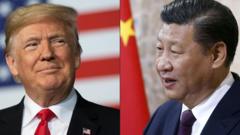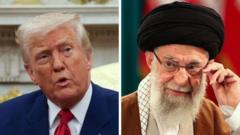China is considering resuming trade discussions with the Trump administration, but insists that U.S. tariffs be lifted first. This comes as U.S. tariffs have caused significant disturbances in China's manufacturing sector.
China Signals Willingness for Trade Talks with U.S., but Tariff Conditions Apply

China Signals Willingness for Trade Talks with U.S., but Tariff Conditions Apply
Amid escalating trade tensions, China's government indicates a readiness for dialogue with the U.S., contingent upon the cancellation of tariffs.
In a notable development in the ongoing trade conflict, China has expressed its willingness to explore negotiations with the United States, provided that the Trump administration first cancels the steep tariffs imposed on Chinese goods. This statement from China's Commerce Ministry indicates a potential shift towards diplomacy amid increasing financial strain on Chinese manufacturers.
China's intention to consider dialogue follows repeated overtures from U.S. officials seeking to initiate discussions. Nonetheless, Beijing has reaffirmed that any engagement would be contingent upon what it calls "sincere actions" from the U.S., specifically the removal of tariffs it believes to be unjust. This highlights a lack of trust and a fraught relationship as both nations grapple with the repercussions of escalating trade barriers.
The tariffs imposed by President Trump have been substantial, with some reaching as high as 145 percent, and their impact is evident. Reports indicate that the manufacturing sector in China saw a significant downturn in April, marking its slowest growth in over a year.
In retaliation, China has not only increased tariffs on American goods but has also restricted access to its market for certain U.S. companies and limited exports of essential minerals crucial for American technology industries, including semiconductors and automotive production.
As this trade clash unfolds, it is increasingly seen as a contest of resolve between President Trump and China’s leadership under Xi Jinping. The political and economic stakes remain high, affecting global market stability and intensifying the separation between the two largest economies in the world.
China's intention to consider dialogue follows repeated overtures from U.S. officials seeking to initiate discussions. Nonetheless, Beijing has reaffirmed that any engagement would be contingent upon what it calls "sincere actions" from the U.S., specifically the removal of tariffs it believes to be unjust. This highlights a lack of trust and a fraught relationship as both nations grapple with the repercussions of escalating trade barriers.
The tariffs imposed by President Trump have been substantial, with some reaching as high as 145 percent, and their impact is evident. Reports indicate that the manufacturing sector in China saw a significant downturn in April, marking its slowest growth in over a year.
In retaliation, China has not only increased tariffs on American goods but has also restricted access to its market for certain U.S. companies and limited exports of essential minerals crucial for American technology industries, including semiconductors and automotive production.
As this trade clash unfolds, it is increasingly seen as a contest of resolve between President Trump and China’s leadership under Xi Jinping. The political and economic stakes remain high, affecting global market stability and intensifying the separation between the two largest economies in the world.




















